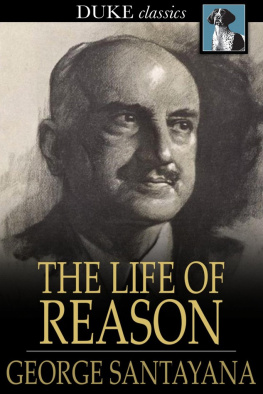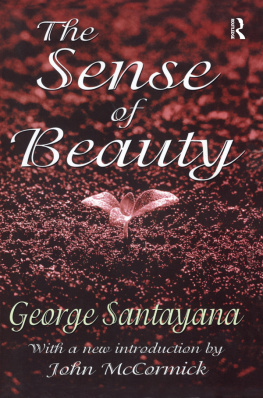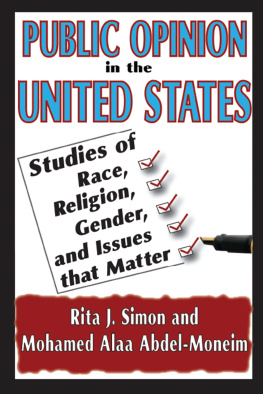Originally published in 1967 by W. W. Norton & Co., Inc
Published 1991 by Transaction Publishers
Published 2017 by Routledge
2 Park Square, Milton Park, Abingdon, Oxon OX14 4RN
711 Third Avenue, New York, NY 10017, USA
Routledge is an imprint of the Taylor & Francis Group, an informa business
New material this edition Copyright 1991 by Taylor & Francis.
All rights reserved. No part of this book may be reprinted or reproduced or utilised in any form or by any electronic, mechanical, or other means, now known or hereafter invented, including photocopying and recording, or in any information storage or retrieval system, without permission in writing from the publishers.
Notice:
Product or corporate names may be trademarks or registered trademarks, and are used only for identification and explanation without intent to infringe.
Library of Congress Catalog Number: 90-21023
Library of Congress Cataloging-in-Publication Data
Santayana, George, 1863-1952.
Character and opinion in the United States / George Santayana, with a new introduction by John W. Yolton. p. cm.
p. cm.(Histoty of ideas series)
Originally published in 1967 by the Norton Library, W. W. Norton & Company, Inc.T. p. verso.
ISBN 0-88738-890-6
1. United StatesCivilization1865-1918. 2. National characteristics, American. 3. Philosophy, American19th century. 4. James, William, 1842-1910. 5. Royce, Josiah, 1855-1916. I. Title. II. Series: History of ideas series (New Brunswick, NJ)
E169.1S2536 1991
973dc20
90-21023
CIP
ISBN 13: 978-0-88738-890-3 (pbk)
George Santayana (18631952) was one of the most fascinating twentieth-century philosophers in Britain or the United States. He had his biological roots in Europe; he was born in Spain, lived in England for a time, and died in Italy. From 1872 to 1912 he lived and went to school in America, received undergraduate and graduate degrees from Harvard University, and then taught at Harvard for twenty-three years. His time at Harvard, as student and member of faculty, placed him in close association with two of Americas most important philosophers, Josiah Royce and William James. These two figures marked a watershed in American philosophy, Royce looking back to the great system-builders, James breaking loose and running in the new directions then developing in this country and Britain: pragmatism and close analysis of concepts. Even the large figures in Britain, Russell and Moore, began their intellectual activities with nineteenth-century idealistic systems (e.g., represented by Bradley and Bosanquet), only to experience radical revulsion from that style of philosophy early in the twentieth century. American figures such as Emerson and Royce took their inspiration from Germany. Santayanas doctoral thesis was also on a German system-builder, Rudolf Hermann Lotze.
By the early years of our century, English-speaking philosophy was breaking away from its attention to systems and was exploring new avenues for dealing with old problems. Santayanas intellectual roots grew in this mixed soil, his own thought sought a systematic understanding of man and the world, but he was also imbued with the importance of scientific and analytic investigations into the nature of mind and awareness, knowledge and action. Both components of his thoughtthe part that built a system for understanding and the other part that sought for precise clarification of the growth of human consciousnesswere influenced by Santayanas keen literary interests and talents. Poetry and literary expression, even for metaphysical concepts, were never far from his pen. What he called literary psychology (similar to what today is called humanistic psychology) became a central concept for his methodology.
One stereotype often applied to him was that of the meditative philosopher removed from the world, living in what he called in his metaphysical system the realm of spirit among eternal essences. Nevertheless, this independence from society should not blind us to the fact that Santayana was a penetrating analyst and critic of contemporary societies. He had a certain objectivity stemming from his not having any firm, permanent home in one particular country; but the strength and accuracy of his analyses of British and American societies grew out of his living in those countries, longer in America than in Britain, and in America at an especially propitious time when life and thought were undergoing changes while still being influenced by older, British traditions.
The attraction of British traditions is evident in Santayanas writings. Of course, the ancestry of American thought and customs lies in Britain, so writing about the America of the late nineteenth century required Santayana to trace some of those parent-country influences and differences. But his interest in English literature, thought, customs, political ideas, and even the countryside was more than just historical. The English intellectual atmosphere appealed more to him than did anything in America. He often wrote about things British with wit and satire, but also with praise. The essays collected in his Soliloquies in England (1922), some of his finest, testify in their magical brevity and pithiness to Santayanas admiration for the British character, the title of one of those essays. We can hear the tone of Santayanas own voice when he says of the Englishman that He carries his English weather in his heart wherever he goes, and it becomes a cool spot in the desert, and a steady and sane oracle amongst all the deliriums of mankind . Earlier in that essay he had said, what governs the Englishman is his inner atmosphere, the weather in his soul. Santayana spent a lifetime of writing and thinking trying to maintain the weather of his soul at a constant, cool, unruffled temperature.
Finding himself in England shortly after leaving America for good in 1912, the out-break of World War I in 1914 increased his isolation from society. In his Prologue to Soliloquies, he describes his walks during those war years (191419) to Iffley and Sandford, to Godstow and Wytham, to the hospitable eminence of Chilswell, to Wood Eaton or Nuneham or Abingdon or Stanton Harcourt while he made notes for or wrote those essays. The very title for that collection emphasizes the singularity and autonomy Santayana experienced and apparently cherished. While not unaware of the war or its casualties (he wrote three sonnets about the war, one on the loss of a close friend), he describes how nature and solitude continued to envelop me in their gentleness, and seemed to remain nearer to me than all that was so near. When, in one of the essays in this volume written in the 191821 period, he writes about St. Bernards happiness in the substitution of an ideal for a natural society, in converse with thoughts rather than with things, Santayanas own preference is evident again. The kind of intellectual he saw himself becoming followed that substitution.
To substitute the society of ideas for that of things is simply to live in the mind; it is to survey the world of existences in its truth and beauty rather than in its personal perspectives, or with practical urgency. It is the sole path to happiness for the intellectual man, because the intellectual man cannot be satisfied with a world of perpetual change, defeat, and imperfection.








![Santayana - The life of reason, [or], the phases of human progress](/uploads/posts/book/233706/thumbs/santayana-the-life-of-reason-or-the-phases-of.jpg)
